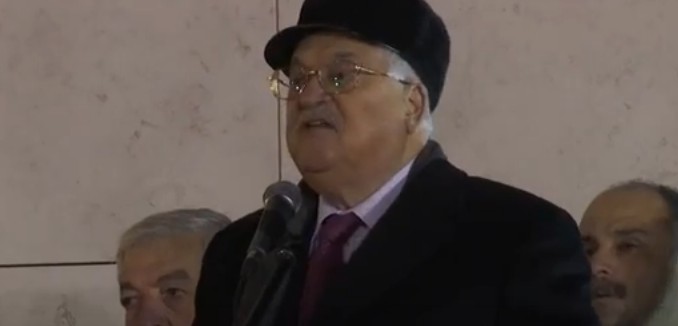Palestinian Authority (PA) President Mahmoud Abbas, who was elected to a four-year term 13 years ago this week, has presided over an “exacerbated crisis of corruption” in the PA even as he has practiced “his own distinct style of nepotism” to enrich his family, Grant Rumley, a research fellow at the Foundation for Defense of Democracies, wrote Tuesday.
While Abbas was initially favored as a reformer and spoke as a reformer, his tenure has been marked by his reneging “on many of his pledges and exacerbated the crisis of corruption and autocracy within the Palestinian Authority.”
Initially, Abbas had been appointed Prime Minister of the PA in 2003 in an effort to dilute the power of his predecessor Yasser Arafat. He was elected to the presidency two months after Arafat died in a Paris hospital.
In 2002, President George W. Bush had laid out a vision for a peaceful two-state solution between Israel and the Palestinians, which included a demand that “Palestinians embrace democracy, confront corruption and firmly reject terror” in order to earn American support for statehood.
Despite surrounding himself with many who were considered to be reformers, including economist Salam Fayyad, when Fayyad’s efforts at reform put him at odds with Abbas, Fayyad “was unceremoniously forced out.”
Abbas actually failed in his boldest attempt at reform when he pushed ahead with legislative election in 2006. Hamas won those elections and used their newfound power to force Fatah, the dominant party in Palestinian politics and one that is headed by Abbas, out of the Gaza Strip in a bloody revolt.
In recent years, “Abbas has since increasingly clamped down on civil society, freedom of expression, and the activities of his political rivals.” This included arresting the leaders of a teachers’ protest a few years ago; implementing “draconian” laws to stifle criticism of his leadership on social media; and purging members of Fatah who opposed his rule.
Abbas’s misrule has resulted in “political regression in the West Bank.”
Rumley observed nearly two years ago that “the West’s refusal to challenge the growing corruption and autocratic rule under Abbas “could have a devastating effect on the long-term prospects for a viable Palestinian state.”
Jonathan Schanzer, Senior Vice President of FDD, had similarly observed in September 2016:
Political challengers are put down with brutality, press freedom has shriveled, and allegations of corruption swirl. The result is a brittle, autocratic government increasingly viewed as a tool for Abbas to wield power, rather than a state in the making.
To undo the damage of the past 13 years, Rumley advised, “If Western officials hope to make progress on the Israeli-Palestinian peace process, they should start by looking for new reformers to revive the institution-building agenda.” “They should also,” he noted futher, “begin to hold Abbas to account.”
[Photo: AP Archive / YouTube]




